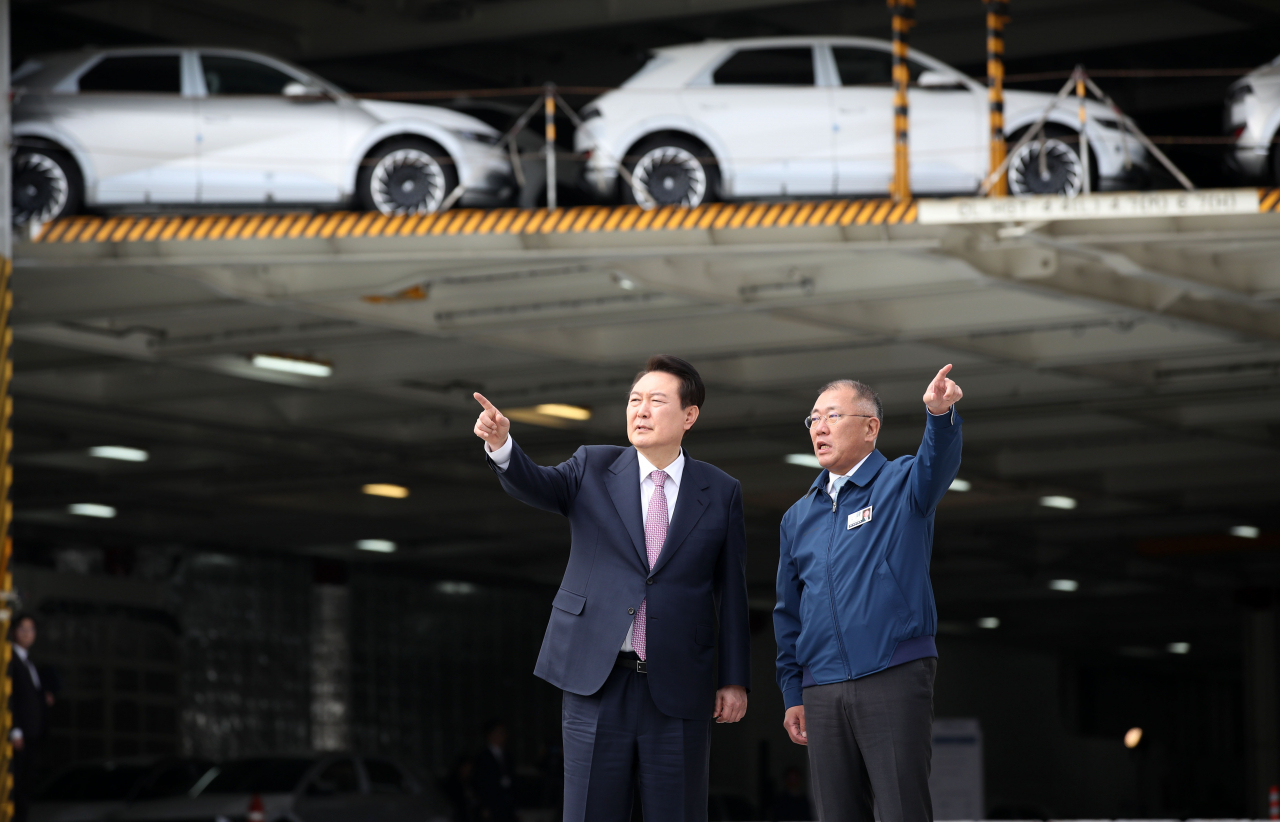 |
President Yoon Suk Yeol (left) and Hyundai Motor Executive Chair Chung Euisun visit Hyundai Motor's Ulsan plant on Thursday. (Yonhap) |
Hyundai Motor Co. on Thursday laid out its goals to ramp up domestic production and exports to the highest figures since the COVID-19 pandemic began three years ago, showing the auto giant’s willingness to overcome various economic and geographical uncertainties.
The record-high targets were announced as President Yoon Suk Yeol visited the automaker’s Ulsan plant. Hyundai Motor Group Executive Chair Chung Euisun accompanied Yoon as the president toured the automaker’s plant.
According to Hyundai Motor, this year's domestic production and export goals are set at 1.85 million vehicles and 1.08 million units, respectively, up 14.3 percent and 28.7 percent from 2020.
Hyundai Motor also presented a plan to turn the Ulsan site -- the company’s main manufacturing facility in South Korea -- into a global hub for future cars, to go beyond the era of automobiles using internal combustion engines.
The automaker said it will expand the domestic production capacity of electric vehicles while renovating its old production sites to enhance competitiveness for building future cars and recruiting talented technicians to cope with automation and technological innovation in the future.
Established in 1968, Hyundai Motor’s Ulsan plant is the world’s single largest automobile plant, covering a site of 5 million square meters with its own export shipments dock. The Ulsan site produced 1.42 million vehicles across 17 models last year. Of them, approximately 66 percent were exported.
According to the Trade Ministry, South Korea logged a record-high auto exports figure of $54.1 billion last year, surpassing $50 billion for the first time while posting a 16.4 percent increase on-year.
The Ulsan site operates five independent plants that are capable of producing about 6,000 vehicle units a day and 1.4 million cars per year. The Ulsan plant accounts for about 25 percent of the automaker’s total global production capacity.
With the Ulsan plant being the linchpin of the automaker’s manufacturing capacity, Hyundai Motor Group became the third-highest-selling automaker by units last year, trailing only Japan’s Toyota Group and Germany’s Volkswagen Group. The Korean automaker sold 6.84 million vehicles worldwide in 2022.
Hyundai Motor started building an additional plant dedicated to manufacturing electric vehicles at the Ulsan site with an investment of 2 trillion won last year. The EV plant is scheduled to be completed and begin operation in 2025.
The construction of the new EV plant is a part of the auto giant’s plan to invest 21 trillion won in the domestic EV sector and produce 1.44 million EVs, to account for about 45 percent of the company’s total EV production worldwide, on South Korean soil by 2030.




![[Exclusive] Hyundai Mobis eyes closer ties with BYD](http://res.heraldm.com/phpwas/restmb_idxmake.php?idx=644&simg=/content/image/2024/11/25/20241125050044_0.jpg)
![[Herald Review] 'Gangnam B-Side' combines social realism with masterful suspense, performance](http://res.heraldm.com/phpwas/restmb_idxmake.php?idx=644&simg=/content/image/2024/11/25/20241125050072_0.jpg)

